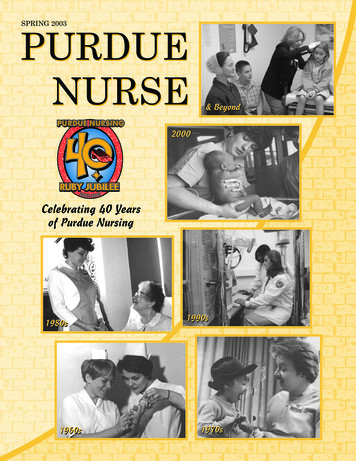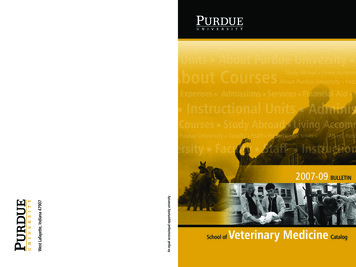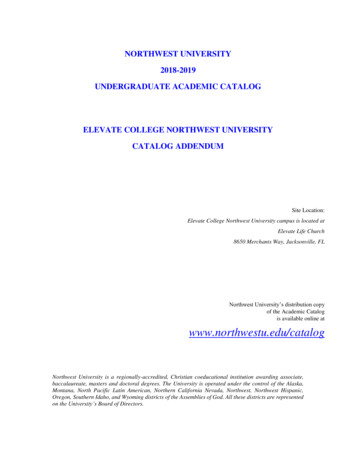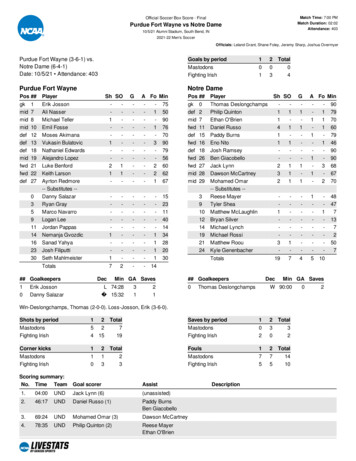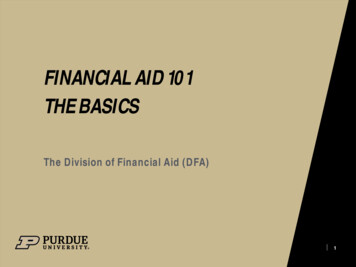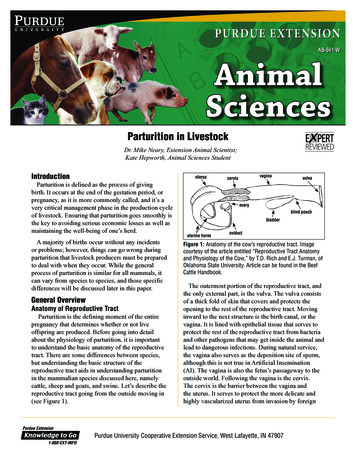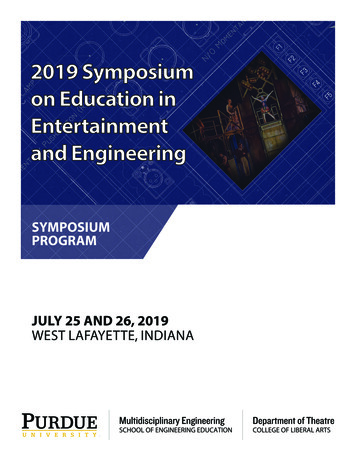
Transcription
Purdue University NorthwestSchool of Education and CounselingCAEP Self-Study ReportMarch 15, 2020Context and Unique CharacteristicsFollowing World War II, Purdue University opened more than forty regional extension centersto serve returning veterans, meet increased numbers of students, and provide technicaleducation throughout Indiana. In 1946, two such centers were opened, one in Hammond andone in Westville. After several decades of operations, these became degree grantinginstitutions: Purdue Calumet and Purdue North Central.In March 2016, the Purdue University Board of Trustees, in an effort to reduce administrativecosts, approved the unification of Purdue Calumet and Purdue North Central, to form a newinstitution, Purdue University Northwest (PNW). A regional institution within the PurdueUniversity system, PNW follows the tradition of land grant universities in providing access toeducation within the communities it serves. The faculty, staff and candidates who comprisePNW continue to expand and challenge conceptions of "talent, innovation, and place" (Gavazzi& Gee, 2018), the hallmarks of the land grant tradition. Through unique partnerships withagencies, schools and districts, faculty and candidates are involved in opportunities whichdirectly impact their communities, allowing them to explore and utilize professional practicesand engage in scholarly pursuits.Located in the second largest urban area in the state, Purdue University Northwest has astudent body that ranks above average in ethnic diversity, racial representation in faculty, andage diversity (College Factual). Northwest Indiana comprises five counties: Lake, Porter,LaPorte, Newton and Jasper. With its close proximity to Chicago, heavy industry (i.e., steelmills, oil refineries, fabricated metals, etc.) continues to be the mainstay of the region'semployment and the basis of regional development. In Northwest Indiana, educationalattainment is relatively low: 34% of the population have some high school, 21% some college,6% associate degrees, 10% baccalaureate degrees, and 5% graduate degrees. Of theeducator preparation candidates at PNW, 34% are first generation students and the majoritycome from 21 high schools. Further, over the last five years, the PNW average time to degreecompletion has improved to 49%, slightly above the state's non-main campus four- yearinstitutions' rate of 48% (ICHE, 2019).In 2020, the School of Education and Counseling at PNW will relocate to CLO on theHammond campus. Along with other resources (i.e., Community Counseling Center; Center forEarly Learning; Educational Resource Center; Strosacker Early Learning Fellows program; andPurdue Educational Leaders Fellows), this move affords us opportunities to work more closelywith one another and our colleagues throughout the University. Proximity and dedicated
spaces for collaboration, will enhance our abilities to design curricular, clinical, and researchopportunities to create and reinforce a culture of creativity, innovation, and commitment totransforming education in Northwest Indiana.Description of Organizational StructureThe Purdue University system comprises four traditional campuses, one online campus, astatewide technology program, and 92 county extension centers throughout the state. ThePurdue University Board of Trustees oversees each university within the system, while eachcampus maintains its own faculty and admissions policies. PNW is led by a Chancellor whoserves as chief executive and academic officer, responsible for recommending andimplementing Board policies.PNW consists of six colleges and four schools; each college is led by a Dean and each schoolis headed by a Director. The School of Education and Counseling (SoEC) is housed in thelargest of the colleges, the College of Humanities, Education and Social Sciences(CHESS).This is similar to the school-within-a-school model in P-12 systems, allowing us tocreate personalized learning environments for candidates to collaborate, engage inextra-curricular opportunities and connect academics with career skills. The SoEC providesoversight for all EPP degree programs leading to licensure.The SoEC has a dedicated budget and curricular processes independent of the college.TheSoEC faculty and staff foster collaboration, develop cross-curricular projects and research, andtrack the progress and provide support for candidates.The SoEC is organized into five programareas: early childhood, elementary, special education, secondary and counseling. Facultycomprise the governing group, responsible for curricular oversight, accreditation efforts,scholarly activity, and engagement. For each program, a faculty member serves as coordinatorto facilitate program activity.The SoEC has five committees responsible for the various roleswithin the management of the unit (i.e., Personnel Committee, SoEC Leadership Team,Curriculum Committee, Student Affairs Committee, and Nominating Committee) and is servedby the functional areas of Recruitment and Retention, Assessment and Accreditation and theOffice of Partnerships and Outreach. Guiding each of these groups and individuals is the SoECDirector in coordination with the Associate Director.Community and candidate engagement occurs through five program area Program AdvisoryCommittees (PACs), student ambassadors, and Educator Preparation Program forums (EPPs). PACs, including faculty members, practitioners, and candidates, meet biannually toanalyze candidate performance data and recommend changes. Candidates recommended by faculty and clinical educators based upon theirperformance as leaders in their program of study serve as student ambassadors whomeet monthly with the Office of Recruitment and Retention to provide input, determineservice projects, engagement activities and how best to meet the needs of candidates.
EPP forums are convened each semester in the three primary counties served byPNW. Members include school administrators and clinical educators who give input onprogramming and guidance on the needs of educators entering the field.Vision, Mission, and GoalsThe foundation for all programs and activities within the PNW Educator Preparation Programare our Vision, Mission, Goals, Values, and Beliefs statements. These statementscommunicate the EPP's purpose, inform our strategic development, and provide a gauge fordetermining the success of the strategies we have undertaken in meeting our goals. Elementsare added or revised as we continue to grow and evolve.VISION: PNW's Educator Preparation Program will transform education and empowereducators to build a better future for all through the (a) construction of knowledge, (b)development of practice through continuous engagement, and (c) cultivation of relationships(Conceptual Framework of the Educational Leader).MISSION: The mission of PNW's Educator Preparation Program is to re-imagine and changeeducation by creating opportunities for students, candidates, families, educators and our localcommunities.GOALS: Revolutionizing the Educator Preparation Program at PNW (REP3) is themanifestation of the EPP Conceptual Framework of The Educational Leader and provides theblueprint for functional and operational aspects of the EPP. Developed through a coconstructive, iterative process, REP3 outlines the goals, tools and measures, strategies andinnovations and assigns ownership to the functional area. We believe The Educational Leaderis one who relies on research to construct knowledge through continuous and integratedinquiry; and is one who develops practice through continuous engagement with diverselearning environments and community while cultivating relationships with learners, partnersand stakeholders. To that end, goals were formulated based on the data collected through theprocesses from the Quality Assurance System.The EPP has adopted eight goals within the framework of the Council for the Accreditation ofEducator Preparation (CAEP) Standards. The goals are to:1. increase the number of candidates successful (i.e., passing) on first attempt oflicensure exams;2. provide training to clinical educators (e.g., training to reliability, SignatureAssessments, best practice in clinical education, etc.);3. create and implement a clinical placement tracking and monitoring system to ensurecandidates have diverse experiences (i.e., rural/urban/suburban; grade levels;demographics; SES; etc.);4. develop and expand relationships with community partners;5. increase diversity of candidates entering and completing EPP degree programs toalign with the demographics of the region;
6. create unique and diverse opportunities for candidates to engage in their profession;7. create infrastructure within the EPP for ongoing study of the impact of candidates/completers; and8. to monitor progress toward meeting goals and establishing new ones for the EPP.EPP's Shared Values and Beliefs for Educator PreparationThe shared values and beliefs of the Educator Preparation Programs (EPP) at PurdueUniversity Northwest (PNW) are the core tenets espoused by all stakeholders. This set ofvalues and beliefs defines "who we are '' as an EPP. They guide our actions, "what we do."And, the shared values and beliefs lead us toward our aspirations, "who we want to be." Justas the EPP's mission, vision and goals are embedded within the Conceptual Framework of TheEducational Leader, the shared values and beliefs define the culture of the EPP. They serve asan ethical compass for all actions, providing essential direction for organizationaldecision-making.Our conceptual framework, The Educational Leader, guides the preparation of futureprofessionals at PNW and illustrates our commitment to our core values. We believe TheEducational Leader is one who relies on research to construct knowledge through continuousand integrated inquiry; one who develops and refines their practice through continuousengagement in diverse learning environments and their community while cultivatingrelationships with learners, partners and stakeholders.The EPP relies on its shared values and beliefs to guide our actions, to shape our culture andto help us envision the possibilities. Built on the vision that transforming education andempowering educators will create a better future for all, the EPP at PNW are committed to thecore values. The principles of these values and beliefs are fundamental to the broadphilosophy guiding the EPP. The Educational Leader is grounded in these shared values andbeliefs:Learning. We believe that learning is contextual, developmental, and a dynamicprocess. We value interactions, social construction, personal, meaningfulness.Transformation. We believe that education is transformational, embedded withinplace, and disrupts the status quo. We value innovation, responsiveness, and enduringsustainability.Leading. We believe that leadership is fostered when learning is foregrounded and thateveryone is a leader and can inspire. We value that collaboration in instruction,engagement and scholarship.Advocacy. We believe that advocacy is a shared responsibility, community-centeredand mutually-defined. We value advocacy as inherent in education.
Health. We believe that educators are models of emotional, physical and mental health.We value self-care and mindfulness.These beliefs reflect the EPP's deeply-rooted allegiance to individual learners, the power ofcollective impact and the transformative role of education. The EPP's commitment to diversity,equity and inclusion are reflected in our shared beliefs and values. Yet, it is imperative that thisbe explicitly and overtly stated. The Educational Leader and the supporting document, EPP'sCommitment to Diversity further demonstrate our dedication to the preparation of educationprofessionals and related specialists who: apply the appropriate knowledge, dispositions, and performances in developing diverseapproaches to educational strategies that are constructive, consistent, and reflective ofsound practice; are prepared to use current research, knowledge, and technology to empower thepeople they serve; are sensitive and responsive to the unique needs of themselves, of others, and of thediverse society in which they practice; and are advocates for and models of quality education and lifelong learning. EPP facultyand staff are committed to providing the human and technological resources that enablecandidates and themselves to develop as educational professionals in constructingknowledge, developing practice, and fostering relationships. The values of Learning,Transformation, Leading, Advocacy and Health undergird the preparation of candidatesto assume complex educational roles inside and outside of traditional educationalenvironments.Meeting the Council for the Accreditation of Educator Preparation (CAEP) StandardsStandard 1 Content and Pedagogical Knowledge (Initial Programs)The Educator Preparation Program at Purdue University Northwest's School of Education andCounseling (SoEC) is committed to ensuring that candidates develop a deep understanding ofthe critical concepts and principles of their discipline. The mission of PNW's SoEC, incollaboration with other professional educators and agencies, is to re-imagine and changeeducation by creating opportunities for students, candidates, families, educators and our localcommunities. We aim to prepare and support education professionals and related specialistswho: apply the appropriate knowledge, dispositions, and performances in developing diverseapproaches to educational strategies that are constructive, consistent, and reflective ofsound practice; are prepared to use current research, knowledge, and technology to empower thepeople they serve; are sensitive and responsive to the unique needs of themselves, of others, and of thediverse society in which they practice; and
are advocates for and models of quality education and lifelong learning.Role of StandardsFaculty members are committed to providing the human and technological resources whichenable candidates and themselves to develop as educational professionals in constructingknowledge, developing practice, and fostering relationships. Each of the program areas in thePurdue University Northwest (PNW) Educator Preparation Program (EPP) is grounded in theten Interstate New Teacher Assessment and Support Consortium (INTASC) Standards,providing opportunities for candidates to develop and demonstrate a deep understanding ofknowledge, skills, and dispositions necessary to create and facilitate learning experiences inpre-k- 12 classroom settings. The EPP ensures that candidates in all programs demonstrate anunderstanding of InTASC Standards in these categories: Learner and Learning; Content;Instructional Practice; and Professional Responsibility(Alignment Chart, EPP Programs andInTASC Standards). The induction of professional educators means that candidates developknowledge and skills at the appropriate progression levels which results in the ability to plan forappropriate and effective curriculum for all learners, implement meaningful and engaginginstruction and use assessment data to inform instruction and show impact on student learning.To prepare for this self-study and to compile and analyze data for Standard 1, programscompiled evidence including Specialized Professional Association (SPA) reports and statereports for low-enrolled programs, exemplars of program practices and candidates'experiences, and identified areas for improvement (SPA Reports and State Reports forLow-Enrolled Programs).Role of ResearchThe PNW EPP conceptual framework highlights the value of research-based practices. TheEPP is also committed to ensuring that candidates use research and evidence to develop anunderstanding of the teaching profession. Further, all clinical educators work with thecandidates to make certain that decisions about instruction, student learning and their ownprofessional practice are informed by research and evidence. Throughout the programs,candidates' work reflects the EPP's Conceptual Framework of The Educational Leader andcommitment to the transformation of education through research-based practices (ConceptualFramework).In course work and field experiences, all clinical educators model the use of research andevidence to develop professional practice and to assess students' growth and development.Bridging the connection between research and practice is one of the tenets of the unit'sconceptual framework. Throughout their coursework, candidates complete smaller-scaleassignments which demonstrate the use of research to inform practice. These courseassignments are broadened and enhanced through completion of the edTPA. The EPPadopted the edTPA, a performance based assessment which is completed during thecandidates' capstone student teaching semester.
Role of CourseworkDuring professional coursework, candidates complete assignments which demand the use ofresearch and evidence to both measure students' progress and their own professional practice.For example, candidates in both Early Childhood and Elementary Education programscomplete the course Literacy Intervention Strategies for Diverse Learners (EDCI 36800).Candidates spend the semester focusing on supporting the literacy development of a learnerwho has been identified as struggling. They complete appropriate assessments to understandstudents' developmental needs, create an instructional plan for students based upon theirassessments, and compile their understandings of the learner and his/her response toinstructional intervention in a Diagnostic Tutoring Report, in which they explain theirinstructional choices with the use of research and evidence from assessment and theinstruction they provide. Candidates enrolled in secondary programs of study complete acourse dedicated to the development of pedagogical content (EDCI 34100, EDCI 34200, EDCI34400, EDCI 34600, or EDCI 34700). Within this course, they are required to create andimplement a minimum of three learning segments where they create and implement plans intheir specific content area. Segments build upon one another as candidates are required tosynthesize feedback from university supervisors and cooperating teachers, assessments ofstudent learning, and research and/or theory to plan the subsequent learning segment andjustify their instructional choices/decision-making processes. Those candidates pursuing duallicensure (Elementary Education-Special Education) complete the Impact on Student Learningassignment as part of the course Teaching Students with Mild to Moderate Needs I (EDPS32800). This assessment requires that they identify a student with exceptionalities, documentthe learner needs and present levels of academic performance, plan differentiated andindividualized instruction, implement evidence- based teaching and motivational instruction,measure and evaluate learning outcomes, and report and reflect upon overall impact onstudent learning. Finally, candidates in the graduate special education program are asked tocreate a two-to- three week unit plan based on the principles of Universal Design for Learning(UDL) for improving reading and/or writing within the Intervention Strategies and Research II:Mild Intervention (EDPS 69500). An integral part of this assessment is the inclusion ofevidence-based strategies and research within their lesson. These measures indicate thatcandidates are required to integrate and apply the principles of research in their planning andimplementation of instruction (Candidate Use of Research and Theory Assignments).These smaller-scale assignments support candidate development toward the capstoneassessment, the Teacher Performance Assessment (edTPA). Candidates in all programscomplete this capstone assessment during the final semester. The edTPA is aligned with theInTASC Standards (edTPA Crosswalk: InTASC Standards, SCALE, 2014). For the edTPA,candidates operate within the constructs of Planning, Instruction and Assessment, in aniterative process that is grounded in research and evidence. Through the series of these threetasks, candidates create and examine their instructional practices responding to prompts thatshape a commentary, making the case for the use of evidence-based practices and strategies.Specifically within the Planning Commentary (edTPA Task 1: Planning-- Rubrics 1-5), they arerequired to use principles from research and/or theory to support their justifications of their
lesson plans and choice of instructional materials that they will use to support students'learning. To do this effectively, candidates must make overt and explicit connections betweenthe research and/or theory, their understanding of students' prior academic learning andpersonal/cultural/community assets, and the learning tasks of their plans. Further, in theAssessment Commentary (edTPA Task 3: Assessment-- Rubric 14),they are required todescribe and explain how the assessment data they have gathered throughout their unit ofinstruction (i.e., learning segment) will be used to inform instruction. They must articulate notonly how the next steps for instruction follow from analysis of student performance data, butsupport their explanations with principles from research and/or theory. Within the EPP it hasbeen determined that the target level of performance on each rubric for candidates is a 2.5/5.0.When examining the average rubric scores for Task 1: Planning and Rubric 14 in Task 3:Assessment in the EPP data, it is apparent that candidates perform above target levelexpectations on these measures (edTPA Performance by Program Area and Rubric). Theirperformance on the edTPA illustrates proficiency in using research and evidence.Overall, the EPP has created a culture in which candidates and all clinical instructors rely onresearch to inform instructional decisions and to measure impact on students' learning as wellas their own professional practice.Content KnowledgeCandidates across the EPP demonstrate their understanding of content knowledge (CK),learners and learning, inclusive instruction and pedagogical practices related to content (PCK),and curriculum through assignments in course work and applied exercises in clinicalplacements. Although grades are not utilized as a measure of CK and PCK, the EPP requiresthat candidates receive a grade of at least a "C" in all coursework and a minimum GPA of 2.5for admission into their program area's professional coursework. These requirements exceedor are similar to the performance of undergraduates at the institution(Candidate performancecomparison). When coupled with candidate performance on specific content and pedagogicalcontent knowledge measures undertaken in each program area, candidates' performancesindicate that they have developed content area understandings and are able to integrate thesein their instruction.Further, program completers integrate content knowledge in their practice (i.e., pedagogicalcontent knowledge, PCK) as reflected in outcomes in response to standards of SpecializedProfessional Associations (SPAs), Indiana Professional Teaching Standards (IPTS/REPA3),and InTASC Standards. The EPP submitted reports to the following Specialized ProfessionalAssociations (SPA) for the initial licensure programs: National Association for the Education ofYoung Children, NAEYC (Early Childhood Education), Association for Childhood EducationInternational, ACEI, Council for Exceptional Children, CEC (Special Education), and NationalCouncil of Teachers of English, NCTE. The B.A. in Elementary Education, B.A. in English withTeaching Option, and the M.S. Ed. in Special Education was recognized with conditions in theirrespective 2018 SPA review. The B.A. in Elementary and Special Education (Dual Licensure)was nationally recognized by its SPA in 2018 and the B.S. in Early Childhood Education was
nationally recognized by NAEYC in 2020 (Compiled SPA Review). Currently, there are sevenidentified low-enrolled programs as well as the Transition to Teach program for which StateReport plans were submitted to the Indiana Department of Education. These programs are allSecondary Education leading to initial licensure; they are: French, Spanish, Social Studies,Mathematics, Chemistry, Physics, and Biology/Life Science (DOE Low-Enrollment Programwith State SPA-Waiver).Pedagogical Content KnowledgeA common tool used to assess the development of candidates' content knowledge andpedagogical content knowledge across the EPP is the Teacher Performance Assessment(edTPA). The edTPA requires candidates to demonstrate the knowledge and skills necessaryto help all learners learn. Occurring during the final semester of the candidates' programs ofstudy, they plan and implement lessons and are evaluated on their abilities to make contentclear and help diverse students learn, assess the effectiveness of their instruction, and modifytheir teaching as necessary. As previously stated, the edTPA is aligned to the InTASCStandards (edTPA Crosswalk: InTASC Standards, SCALE, 2014). Examining candidateperformance on edTPA rubrics 1-4, 7-9, and 14 illustrate the development of candidates'content knowledge and pedagogical content knowledge (edTPA Performance by Program Areaand Rubric). The target level of performance on each rubric for candidates is a 2.5/5.0.Candidates have historically exceeded this level of performance on all of the aligned contentknowledge rubrics, with the exception of the first semester implementation performance onrubric 4 that requires candidates to identify and support language demands associated with thetask; rubric 8 which requires candidates to elicit student responses that promote thinking anddevelop content- specific skills, concepts, strategies and/or processes; and rubric 14 whichrequires candidates' to analyze students' use of language to develop content understanding.As is illustrated in the edTPA Performance by Program Area and Rubric, during the spring2018 administration of the assessment, early childhood (ECH) program candidates performedslightly below the target level of performance on these rubrics (R4 2.2; R8 2.4 and R14 1.8);Elementary education candidates scored slightly below target performance on R14 (2.1).Subsequently, the early childhood program area incorporated requirements in the practicumcourse (a course that occurs in the semester prior to student teaching) where language anddevelopment of content understandings were foregrounded. Additionally, all program areasengaged candidates in clarifying key concepts of content knowledge rubrics especially:language demands (i.e., vocabulary, functions, discourse, syntax); language function (purposefor which language is used); vocabulary; discourse; syntax; and language supports (thosescaffolds, representations, and strategies used to help learners understand and use theconcepts and language of the discipline). Similar difficulties on rubrics 1 (planning for contentlearning) and 2 (planning support for varied learning needs) are noted in the first administrationwith special education candidates in the spring 2019. To address the development of theseunderstandings, the special education program area implemented activities within courseworkrequiring candidates to develop and implement units of study based on Universal Design forLearning (UDL) principles, and that required purposeful and intentional use and development ofacademic language within the content area.
The Skills of Teaching Observation Tool (STOT), developed by the North Dakota Associationof Colleges for Teacher Education as a means for determining student teachers' ability to meetprofessional standards (InTASC Standards is used by the EPP throughout candidates’programs of study to assess their performance in classrooms. Created in 2016, there havebeen two confirmatory factor analyses to establish this tool as both a valid and reliablemeasure on four factors: the learner and learning context, knowledge, instructional practices,and professional responsibilities. Candidate performance on the STOT provides furtherevidence of their development of content knowledge and abilities to apply theseunderstandings in authentic contexts (i.e., pedagogical content knowledge). Candidateperformance on the STOT (Candidate Skills of Teaching Observation Tool on InTASCStandards by Program Area) provides additional evidence that candidates across the EPPhave developed the content knowledge and pedagogical content knowledge appropriate fortheir discipline and are able to incorporate these understandings within their instruction.State StandardsA focus on academic standards is foundational to the EPP and teaching to academic standardsis a central component of candidate course work and clinical experiences. The IndianaAcademic Standards serve as the College and Career Readiness Standards that have beenadopted for use in classrooms throughout the state. Within the academic standards for eachgrade level, college and career goals or benchmarks are identified allowing the standards to bevalidated as college and career ready. This means that students who master them will beprepared to join the workforce or pursue post-secondary education (Indiana Department ofEducation Readiness Standards, 2018). A variety of measures are employed by the EPP toensure that candidates demonstrate the skills and commitment necessary to afford all P-12students access to rigorous educational experiences that prepare them for college- and/orcareers.One such measure is the determination of coursework that is required for candidates as part oftheir educator preparation program. Candidates' programs of study are guided by the IndianaDepartment of Education Rules for Educator Preparation and Accountability (REPA3). REPA3provides guidance to EPPs in how to document alignment for educator licensure. Thesestandards provide a broad and comprehensive understanding of the knowledge and skillsneed
TheEducator PreparationProgram at Purdue University Northwest'sSchool of Education and Counseling(SoEC) is committed to ensuring that candidates develop a deep understandingof thecritical concepts and principles of their discipline. The mission of PNW's SoEC, in collaborationwith other professionaleducators and agencies, is to re-imagine and change
